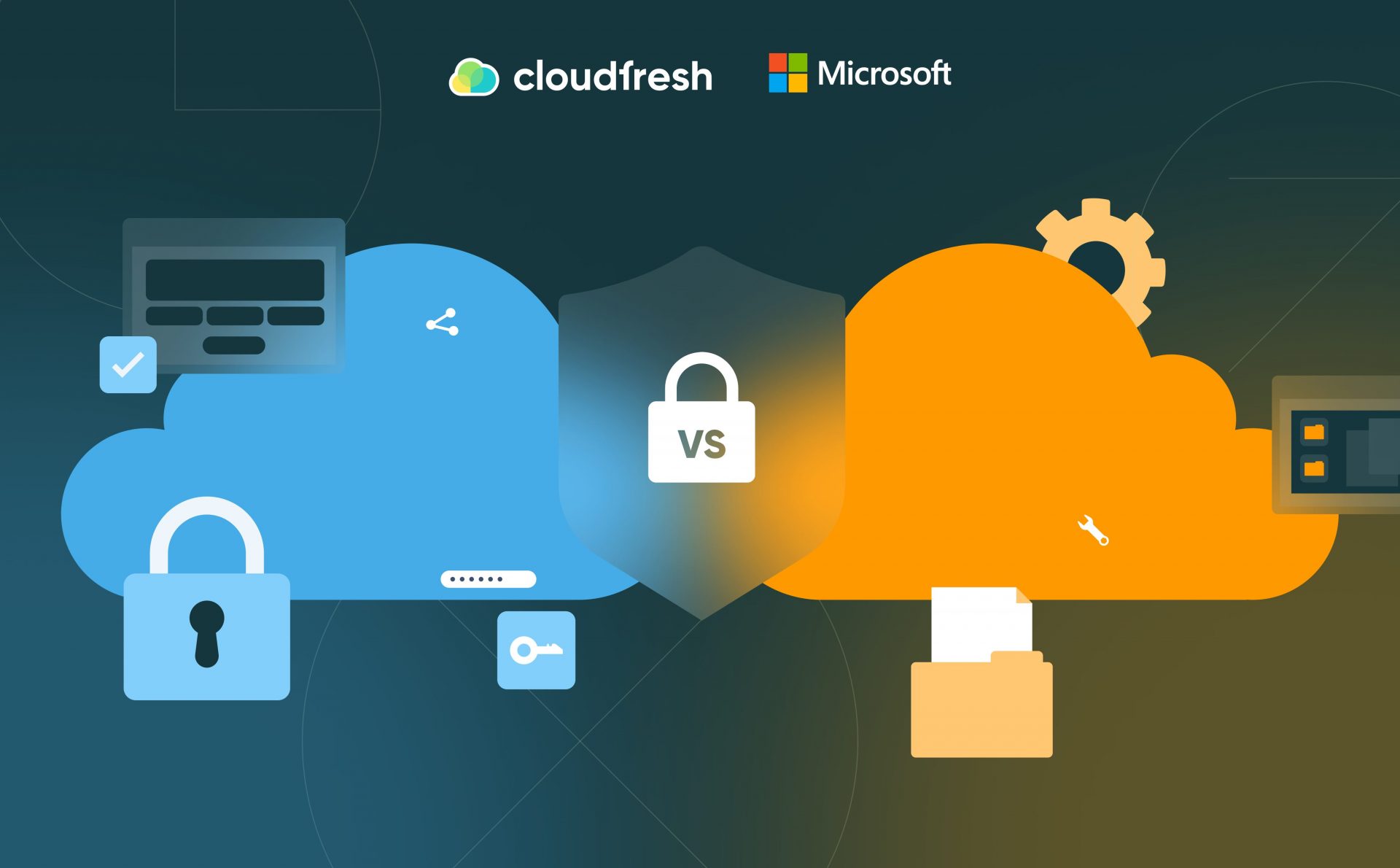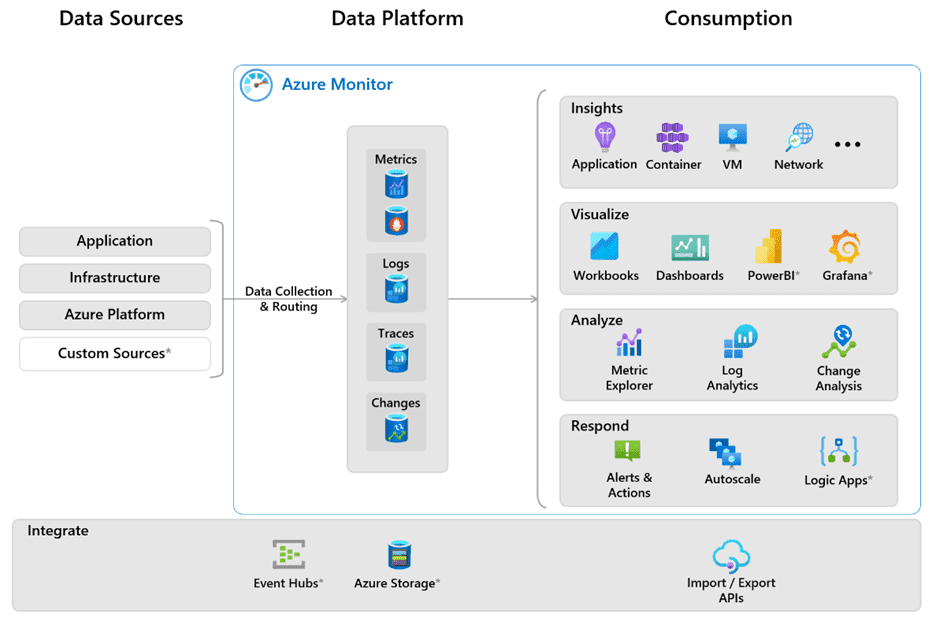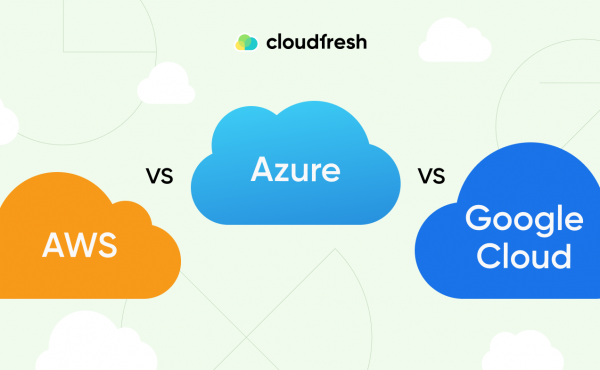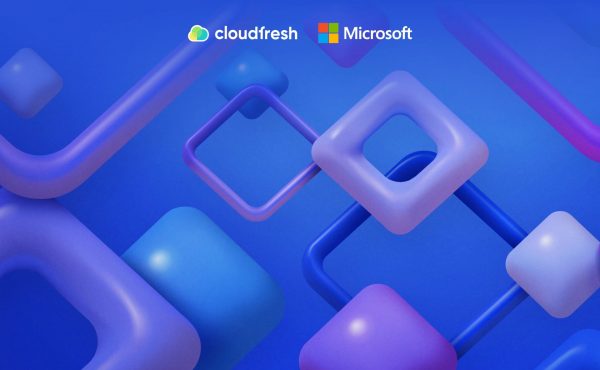AWS vs Azure vs Google Cloud
Azure Security vs AWS Security: What’s the Difference Between Them & Which One to Choose?

Can you believe it? As of March 2024, 60% of all business data is stored in the cloud. And guess who’s holding the defense? Amazon’s Amazon Web Service (AWS) and Microsoft’s Azure — are the big players in this digital playground. But when it comes to choosing between AWS Security vs Azure Security, many companies find themselves in a quandary.
Well, apart from making things super flexible, organizations want their data to be safe and sound, no matter what cyber storms may come their way. IBM defines cyber resilience as an organization’s ability to persist in its operations despite encountering a cybersecurity incident that disrupts services.
Within the zero-trust paradigm, six pillars emerge as critical components:
- Identity. Verification of the identity of any entity seeking network access.
- Data. End-to-end encryption mechanisms to safeguard data integrity.
- Infrastructure. Configurations and protocols to detect and neutralize threats.
- Networks. Monitoring and segmentation techniques to mitigate lateral movements of threats.
- Devices. Ensuring security and health compliance for all connected devices.
- Applications and APIs. Securing applications and APIs to minimize risks and maintain access control.
With the cloud market racing towards a trillion-dollar milestone by 2026, AWS and Azure security products are pulling out all the stops to win over customers. With both providers continuously expanding their infrastructure and capabilities to meet the evolving demands of cloud-native enterprises, the focus on security intensifies.
In this article, we’re diving deep into the AWS and Azure security features. Our goal? To help businesses like yours pick the cloud security champ that suits their needs best. So, buckle up as we compare Azure security vs AWS security, guiding you through the cloud security maze with ease.
Azure: Introducing Microsoft Cloud Security Solution
So, you’ve decided to explore the cloud storage world, and Microsoft Azure security model has piqued your interest. But what is it exactly? It’s a comprehensive cloud computing service offered by Microsoft. The platform is designed for building, testing, launching, and managing applications and services.
It boasts the world’s most extensive cloud infrastructure, spanning 60 regions and 300 physical data centers worldwide. It’s a global network ensuring exceptional reach and reliability.
On the security side, Azure adheres to a shared responsibility model that delineates responsibilities between Microsoft, the infrastructure guardian (managing physical, network, and host security) and customers, tasked with securing the resources they deploy and use.
Azure security products include:
- Azure Active Directory (AAD)
- Azure Cyber Security Center
- Azure Key Vault
- Azure Information Protection
With a robust set of Azure security features and tools, enterprises can confidently navigate the digital landscape knowing that their assets are protected by the latest cybersecurity innovations.
What Exactly is Amazon Web Services (AWS)?
Microsoft Azure has a worthy competitor in the cloud storage arena: Amazon Web Services, or AWS for short. What is it exactly? It’s a comprehensive cloud computing platform offering on-demand access to scalable computing power, storage, networking, and a whole host of other features.
AWS boasts a global network of data centers, strategically located across 20 countries and a staggering 100 locations around the world. Amazon offers a full suit of AWS security features and services:
- Amazon Identity and Access Management (IAM)
- Amazon CloudWatch
- AWS Shield
- AWS Key Management Service (KMS)
Azure Security vs AWS Security: Key Differences
In today’s landscape of ubiquitous online storage platforms, the quest for top-notch cloud storage security is paramount. The AWS vs Azure security competition is fierce. Let’s unravel the differences and discover the best fit for your security needs.
Identity and Access Management (IAM)
For organizations with a vast user base, managing user identities securely is crucial. Identity and Access Management (IAM) comes into play here. IAM helps companies establish and enforce policies for user access through various processes like:
- Verifying user identities before granting access.
- Determining what resources and actions each user is allowed to access.
- Implementing secure password practices to prevent unauthorized access.
- Granular control over user permissions to specific resources.
- Adding, modifying, or removing user accounts efficiently.
- Tracking user activity and ensuring adherence to data security regulations.
Microsoft Azure security model offers basic IAM functionalities:
- Cloud authentication for user verification.
- Unlimited single sign-on (SSO) for seamless access to multiple applications.
- Multi-factor authentication (MFA) for an extra layer of security.
- Role-based access control (RBAC) to assign permissions based on user roles.
For advanced features like secure mobile access, detailed security reports, and enhanced monitoring, a premium subscription starting from $6 per user/month is required.
Security is paramount for AWS. They operate under a shared security responsibility model, similar to Azure. This means that AWS takes responsibility for the security of the underlying infrastructure, including data centers and network architecture. On the other hand, you are responsible for the security of the resources you host in the cloud, such as your applications, data, and virtual machines.
For those who already invested in AWS, it offers a comprehensive IAM solution at no additional cost, which includes:
- Fine-grained permissions for precise control over user access.
- Single sign-on (SSO) for streamlined application access.
- Support for compliance regulations to meet industry security standards.
- Multi-factor authentication (MFA) to strengthen security.
- Shared access capabilities for simplified account management.
- Integration with various AWS services for a cohesive cloud experience.
An important security benefit of AWS IAM is that only administrators can assign permissions, ensuring stricter security by default. However, for hybrid environments that combine cloud and on-premises infrastructure, integrating AWS IAM with Azure Active Directory might be necessary.
Encryption Options
Azure offers data encryption at rest and in transit using various algorithms like AES-256. Customers manage their encryption keys with Azure Key Vault, a secure key management service. The platform also offers client-side encryption for additional control over data security.
AWS provides encryption for data at rest and in transit using industry-standard algorithms. AWS Key Management Service (KMS) offers secure key management for encryption keys. Additionally, AWS supports client-side encryption for data stored in S3 buckets.
Monitoring and Detection
Azure Cyber Security Center provides a centralized platform for monitoring security posture, identifying threats, and responding to security incidents. It offers security recommendations, vulnerability scanning, and integration with other Azure security products.

Source: microsoft.com
Amazon CloudWatch is a monitoring service for AWS resources. It provides detailed metrics on resource utilization, performance, and security. CloudWatch integrates with Amazon Security Hub, a central repository for security findings across AWS services.
Compliance Certifications
Azure holds numerous compliance certifications and attestations, including:
- Azure Compliance Manager for assessing and managing regulatory compliance.
- Azure Security and Compliance Blueprint for implementing industry-standard compliance controls.
AWS also boasts a comprehensive list of compliance certifications, including ISO 27001, ISO 27017, PCI DSS, FedRAMP High, HIPAA, and GDPR. Similar to Azure, this signifies AWS’ dedication to meeting strict data security and privacy standards.
Logging and Auditing
Azure Monitor provides comprehensive logging capabilities for Azure resources. It collects data on user activity, system events, and resource utilization. Azure Sentinel offers advanced log analytics and capabilities, including:
- Centralized logging and analysis of security events, user activities, and system events.
- Audit logs for tracking changes to Azure resources and configurations.
- Security alerts and notifications for security incidents.
- Integration with SIEM (Security Information and Event Management) tools for comprehensive security monitoring.
AWS CloudTrail is a service that continuously captures and logs AWS API calls. This provides a record of user activity and resource changes. Additionally, Amazon CloudWatch Logs offers centralized log management for various AWS services.
Security Assessments
Azure offers a Security Center for identifying potential security vulnerabilities. It provides recommendations for remediation and integrates with third-party security assessment tools, including:
- Security best practice recommendations for improving security posture.
- Compliance checks for assessing regulatory compliance and adherence to security standards.
- Alerts and notifications for addressing security issues and vulnerabilities.
AWS Security Hub aggregates findings from various AWS security features and partner solutions. It provides a unified view of your security posture and helps prioritize vulnerabilities:
- Security checks for identifying security vulnerabilities, misconfigurations, and compliance issues.
- Cost optimization recommendations for improving resource efficiency and reducing costs.
- Performance checks for optimizing AWS infrastructure and application performance.
- Integration with AWS Security Hub for centralized security management and monitoring.
Additionally, AWS offers Amazon Inspector for automated vulnerability scanning of Amazon Machine Images (AMIs) and EC2 instances.
Choosing the Right Cloud Security Platform
Both Azure and AWS offer robust security features, but the ideal platform for your organization depends on several factors.
Security Requirements
Identify your specific security needs. What data are you storing? What compliance regulations do you need to meet? Do you require advanced threat detection or vulnerability scanning capabilities?
While both platforms offer a wide range of compliance certifications, Azure might have a specific certification you require depending on your industry regulations.
Existing Infrastructure
Consider your existing IT infrastructure. Are you heavily invested in Microsoft cloud security products? If so, Azure might offer a more seamless integration due to its native compatibility.
For organizations heavily invested in Microsoft technologies, Azure also provides seamless integration with Microsoft Office 365, Dynamics 365, and other Microsoft services.
Scalability
Think about your future growth plans. Does your organization anticipate significant data growth or require the ability to quickly scale security features? Both Azure and AWS are highly scalable, but evaluating your specific needs will help you determine which platform offers the most flexibility for future expansion.
Azure’s hybrid cloud capabilities, such as Azure Arc and Azure Stack, enable organizations to extend their on-premises infrastructure seamlessly into the cloud while maintaining robust security controls.
User Experience and Expertise
Consider the user-friendliness of each platform’s security tools. Does your IT team have experience managing either Azure or AWS security services? The learning curve associated with each platform can influence your decision, especially if your IT team has existing expertise with one provider over the other.
Double the Security with Cloudfresh
Migrating your data to the cloud can be a complex process, and security is a top priority. While both Azure and AWS security features are excellent, partnering with a cloud security expert can provide an extra layer of protection and peace of mind.
Cloudfresh, an official Microsoft Azure Partner, specializes in helping businesses implement and manage secure solutions. We offer you:
- Expert Guidance — Our team navigates cloud complexities, providing best practices for designing and managing solutions to achieve desired outcomes.
- Flexible Solutions — We design and implement scalable solutions that adapt to evolving business needs, providing ongoing support for effective cloud infrastructure management.
- Rapid Deployment — Our pre-built solutions and accelerators speed up Azure project launches.
- Latest Innovation — Partner with us to access cutting-edge tools, technologies, and services.
- Cost Efficiently — We help optimize cloud infrastructure, potentially reducing costs and offering volume discounts.
Remember, security is a shared responsibility. Even with the help of a partner, it’s crucial to maintain a proactive approach to securing your cloud environment. Stay informed about the latest threats and best practices.
Contact our specialists now to get a consultation.













